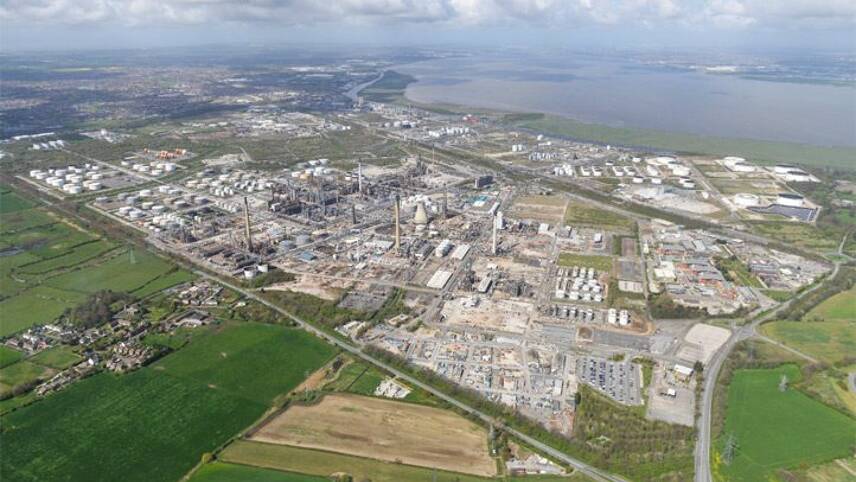Register for free and continue reading
Join our growing army of changemakers and get unlimited access to our premium content

The UK Government has committed to fully decarbonising at least one industrial cluster by 2040. Pictured: Ellesmere Port
The Government has announced that 20 projects will be examined for the next stage of its CCUS programme. The programme has been set up to identify projects and solutions that will enable CCUS technology to be deployed at key industrial sites across the country. The UK is aiming to fit CCUS technology at two clusters by the mid-2020s, with deployment to take place at two additional clusters by 2030.
The UK is aiming to deliver the world’s first fully decarbonised industrial cluster by 2040. The HyNet cluster in North West England and North Wales, and the East Coast Cluster in the Teesside and Humber have already been selected as Track 1 clusters, meaning CCUS solutions will be fitted in those locations in the mid-2020s and will be the first to access support under the CCUS programme, which includes the £1 billion CCS Infrastructure Fund (CIF).
A total of 41 CCUS and hydrogen projects were considered eligible for this programme and 20 have been selected for possible Government support. Projects will be examined across a “value for money” spectrum and potential support will be issued in the form of revenue contracts to cover operation costs as well as access to the CIF and Net-Zero Hydrogen Fund.
Shortlisted projects will be considered for government funding support to join one of these clusters.
The full shortlist of projects is: Net Zero Teesside Power, Whitetail Clean Energy, Keadby 3 Carbon Capture Power Station, bpH2Teesside, H2NorthEast, Hydrogen to Humber (H2H) Saltend, HyNet Hydrogen Production Project (HPP), CF Fertilisers Billingham Ammonia CCS, Tees Valley Energy Recovery Facility Project (TVERF), Norsea Carbon Capture, Redcar Energy Centre, Teesside Hydrogen CO2 Capture, Humber Zero – Phillips 66 Humber Refinery, Prax Lindsey Oil Refinery Carbon Capture Project, ZerCaL250, Hanson Padeswood Cement Works carbon capture and storage project, Viridor Runcorn Industrial CCS, Protos Energy Recovery Facility, Buxton Lime Net Zero, Carbon Dioxide Capture Unit – EssarOil UK.
Some of these projects have already made huge inroads including the HyNet initiative which has previously unveiled a demonstration for producing float sheet glass using pure hydrogen and a supply programme with Unilever.
Commenting on today’s announcement, David Parkin, HyNet Project Director said: “We are delighted that six HyNet projects, including Hanson’s Padeswood Cement Plant and Viridor’s Runcorn Energy Recovery Facility, have received the go-ahead from Government to establish carbon capture and storage infrastructure within the North West.
“This will give the North West the opportunity to produce the UK’s first zero carbon cement, and to abate emissions from the UK’s largest Energy from Waste facility. The hydrogen produced from Vertex will allow vital industries such as chemicals, food and drink, paper and metal production to fully decarbonise, retaining and creating new high-value manufacturing jobs. By 2030, HyNet will be capturing and storing 10 million tonnes of carbon dioxide – a greenhouse gas – each year, a quarter of all emissions across the north west of the UK. Today’s announcement is a critical step in ensuring HyNet gets delivered, delivering real decarbonisation progress and delivering economic benefit to the region.”
UK’s aim
The overarching target for CCUS to date has been for the UK to fully decarbonise at least one industrial cluster by 2040. Clusters are seen as less risky locations for deployment as, with dispersed sites, new transportation infrastructure will be needed.
The UK Government has increasingly focused on CCS since setting its legally binding net-zero target. Before then, the previous £1bn competition fund for CCS was actually scrapped by the now-defunct Department for Energy and Climate Change (DECC).
According to the CCC, CCUS is a “non-optional” component of the UK’s transition to net-zero. However, some green groups would like to see Ministers doing more to prioritise technologies that are already mature, alongside nature-based solutions for sequestering carbon, in the short to mid-term.
Under the Ten Point Plan, the UK would capture 10 million tonnes of CO2 annually by 2030, whereas the CCC’s modelling on the Sixth Carbon Budget recommends capturing 22 million tonnes per year by 2030. As part of the Sixth Carbon Budget, Prime Minister Boris Johnson has agreed to legislate a new target to reduce national emissions by 78% by 2035.
Last year, the Carbon Capture and Storage Association (CCSA) published a report on the scaling up of CCUS technologies in the UK over the next decade. The report claimed that 10,000 new jobs could be created by the mid-2020s, namely in key industrial locations. Moving to deploy CCS early would also create new export opportunities which could create a potential 50,000 jobs while safeguarding more than 50,000 jobs in carbon-intensive industries at risk during the low-carbon transition, such as iron, steel, cement, chemicals and refining. Funding requirements to deploy CCUS as the necessary scale ranges from £1.2bn to £2.6bn.
The CCSA’s chief executive Ruth Herbert said: “ This announcement also sends a very strong signal that CCUS and net-zero remains a priority for the UK Government, particularly since it comes during a change in leadership. CCUS is critical in achieving net-zero and positioning the UK as the world’s first at-scale hydrogen economy. It will transform our industrial regions – driving jobs and growth through inward investment and export opportunities.
“We look forward to getting further clarity on the timetable for future phases and the selection of further clusters in the Autumn, as well as progress on the Energy Bill – all crucial if we are to meet the government’s ambition of four operational clusters by 2030, remain on track to achieve net-zero by 2050 and secure our place as a global leader in CCUS technology.”


We need this on power stations – now – where emissions are massively larger than industrial uses.